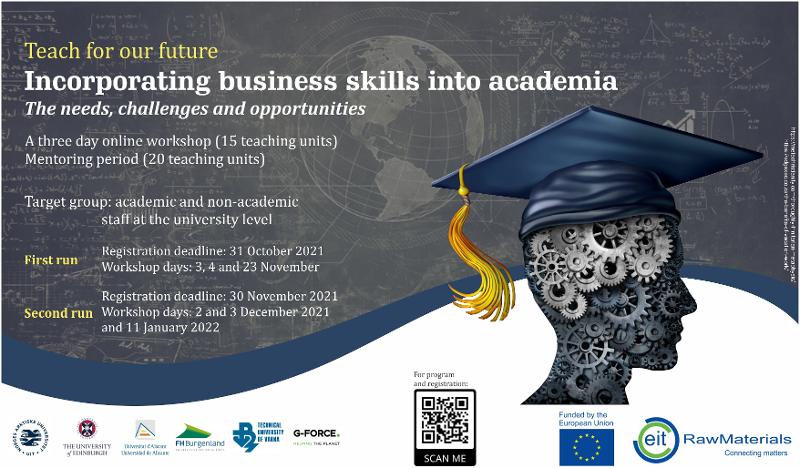Incorporating business skills into academia
The needs, challenges and opportunities
Registration: https://nettskjema.no/a/220465 (FREE REGISTRATION)

The spectacular growth of IT technology coupled with climate change will impact the labor market; new jobs will appear and others will disappear. How does the academic sector get ready to meet this challenge?
Incorporating business skills into academic courses is one way to respond to the challenge. Such courses aim to provide students with skills that enable them to pursue careers that connect science and society. These multidisciplinary courses should be prepared in the context of classical (i.e., one-subject) course programmes that give the students a deep knowledge of a specific topic. Therefore, the multidisciplinary courses will not replace existing course programmes, but they will provide the students with the skills needed to better develop careers that connect their field of expertise with evolving societal needs.
The workshop will highlight the importance of incorporating business skills into academia based on the real experience of former students/academics who succeeded as entrepreneurs in various business and industry sectors. This pedagogical activity is designed as a condensed workshop (three days), which will be followed by a mentoring period of three weeks. The mentroing period is not obligatory.
First run - workshop days: 3, 4 and 23 November (registration deadline: 31 October 2021)
Second run - workshop days: 2 and 3 December 2021 and 12 January 2022 (registration deadline: 30 November 2021)
Registration: https://nettskjema.no/a/220465 (FREE REGISTRATION)
Learning outcomes:
- Participants will understand the need to incorporate business skills into academia. (covered on the first day of the workshop).
- Participants will understand and discuss the challenges and opportunities tied to incorporate business skills into academia (covered on the second day of the workshop).
- Participants draft and design multidisciplinary courses/activities that relate to their area of expertise (covered during a mentoring period of three weeks).
- Participants understand, discuss and exchange good practices regarding incorporating business skills into academia (covered on the third day of the workshop, which is held after the three-week mentoring period).
Target group:
Academics (all the levels, i.e., researchers, assistant professors, associated professors and professors) and non-academic staff.
Method of communications: online course series
The workshop and the mentoring period will be accessible online. It is expected to have participants from all campuses from the following universities:
- UiT The Arctic University of Norway, Norway
- The University of Edinburgh, UK
- The University of Alicante, Spain
- University of Applied Sciences Burgenland, Austria
- Technical University of Varna, Bulgaria
Few seats will be available to academics/non-academics from the following countries regardless of their universities: Norway, UK, Spain, Austria and Bulgaria. Priority will be given to under-represented groups.
Workshop program:
Day-one: Incorporating business skills into academia - the needs
The need to incorporate business skills into academic courses at the university level will be highlighted based on real examples. Former students/employees in the academic sectors who succeeded in moving and making impacts in business/industry sectors will present their experiences showing the importance of having such multidisciplinary courses. They will share their insights in the form of an interview/live talk/recorded interview, followed by a Q&A session.
Day-two: Incorporating business skills into academia - challenges and opportunities
The participants will get together in small groups of two-four participants (multidisciplinary groups). They reflect on the input they have received on the first day and discuss the challenges and opportunities related to incorporating business skills into academia. This session will take three hours; the sessions will be hosted online using Zoom. In the end, each group summarizes the major outcomes of their discussions. Then the groups will have two hours to outline a sample multidisciplinary course and/or activity.
Mentoring period: preparation of multidisciplinary course/activity
Each group (as formed on the second day) will continue to work on their project. This is peer-to-peer mentoring where each participant will contribute her/his knowledge to the ongoing discussion. Each suggested course/activity should have clear teaching objectives, define learning outcomes and teaching methods, as well as a method of assessment.
Note: The mentoring period is an option and a separate certificate will be issued to participants who complete this task.
Day-three: conclusions, presenting the various designs and knowledge sharing
Each group will present their projects (i.e., the multidisciplinary course/activity designed during the mentoring period). The presentations should include teaching objectives, learning outcomes, teaching methods and method of assessment.
The different groups are invited to share the learnings and challenges they encountered in the design of such courses/activities. Groups will present how they solved these challenges based on the experiences gathered in designing their course/activity.
Certifications and total working hours:
- Participants who actively attend the three days of the workshop will get a certification for 15 teaching hours.
- Participants, who will actively attend the mentoring period and come with a project (e.g. suggested course), will get a separate certification with 20 teaching hours.
First run - workshop days: 3, 4 and 23 November (registration deadline: 31 October 2021)
Second run - workshop days: 2 and 3 December 2021 and 12 January 2022 (registration deadline: 30 November 2021)
Registration: https://nettskjema.no/a/220465 (FREE REGISTRATION)
Registration platform is hosted at the University of Oslo but the form is valid for all academic and non-academic from different universities and different countries.
Sponsor: The workshop is sponsored by the CloudEARTHi project (a project funded by the EIT RawMaterials and European Union) with a partnership with RESULT, UiT The Arctic University of Norway, the University of Edinburgh, the University of Alicante, The University of Applied Sciences Burgenland, Technical University of Varna and G-Force.
The CloudEARTH initiative is funded and supported by
